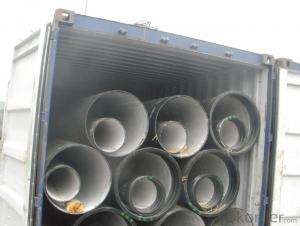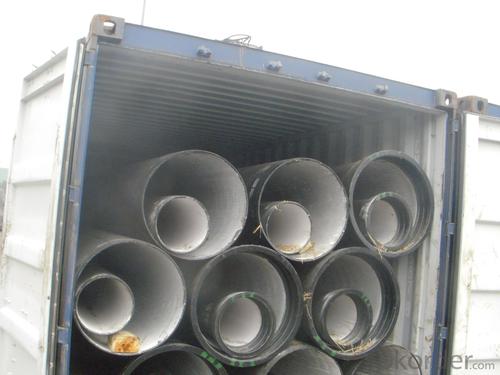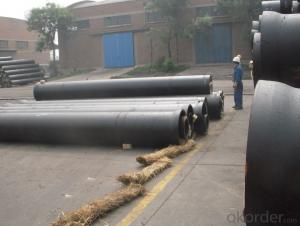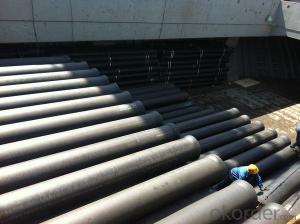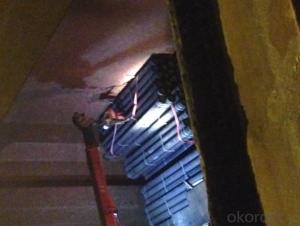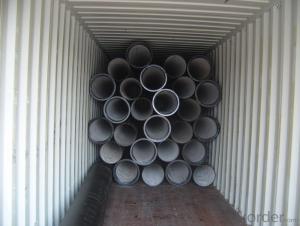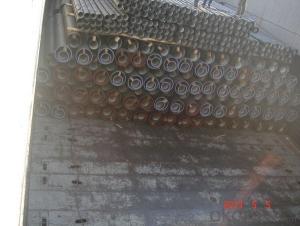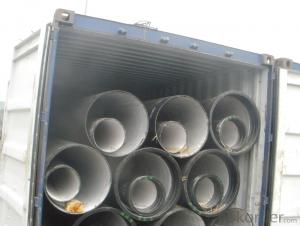DUCTILE IRON PIPES AND PIPE FITTINGS C CLASS DN1100
- Loading Port:
- Tianjin
- Payment Terms:
- TT OR LC
- Min Order Qty:
- 22 m.t
- Supply Capability:
- 30000 m.t/month
OKorder Service Pledge
OKorder Financial Service
You Might Also Like
Material : Ductile Cast Iron
Size Range : DN 80mm to DN 2000mm
Unit Effective Length : 6m or 5.7m
Manufacture Standard: ISO 2531:1998/ EN 545:2006/EN 598:2007
Annual capacity : 200,000 tons
Coating Exterior: Zinc 130g/m2 according to ISO 8179-1 and bitumen coating 70 microns.
Cement Interior: Portland Cement/ High Alumina Cement/ Sulphate Resisting Cement Lining according to ISO 4179
Special requirements on external coating and internal lining can be applied
We also provide accessories such as SBR/EPDM rubber gaskets, lubricant paste, pipe caps, PE sleeves, etc.
Additional Parts:
Each pipe is strictly inspected according to related standard to ensure permanently high performance.
Easy Installation at site and service free for life
Long Service Lifespan
Quotation will arrive you within 24hours once we get your inquiry.
We guarantee offering you a competitive price.
A copy of original inspection reports of pipes will be offered after shipment.
Photos of loading process will be sent to the customer after shipment effect.
We will follow-up the delivery progress after shipment effect and update to the customer on weekly basis.
- Q: How does ductile iron pipe perform in extreme temperatures?
- Ductile iron pipe is known for its exceptional performance in extreme temperatures. Due to its unique composition and manufacturing process, ductile iron pipe can withstand both high and low temperatures without compromising its structural integrity. In high-temperature environments, ductile iron pipe demonstrates excellent heat resistance. It can withstand temperatures up to 1000 degrees Fahrenheit, making it suitable for applications that involve hot liquids or gases, such as steam pipelines or industrial processes. The high strength and thermal stability of ductile iron allow it to maintain its shape and structural integrity even under extreme heat conditions, ensuring long-term reliability and safety. Similarly, ductile iron pipe also performs well in low-temperature environments. It can endure sub-zero temperatures without becoming brittle or prone to cracking, which is a common issue with other materials like cast iron. This makes ductile iron pipe ideal for applications in cold climates, such as water distribution systems in freezing temperatures. Furthermore, ductile iron pipe's ability to resist thermal expansion and contraction is another advantage in extreme temperatures. It has a low coefficient of thermal expansion, meaning it expands and contracts less compared to other materials. This property helps to minimize the stress on the pipe and reduces the risk of leaks or failures caused by temperature fluctuations. In summary, ductile iron pipe exhibits exceptional performance in extreme temperatures. Its heat resistance, ability to withstand low temperatures, and resistance to thermal expansion and contraction make it a reliable choice for various applications, ensuring safe and efficient operations even in challenging environments.
- Q: Can ductile iron pipes be used for offshore oil and gas installations?
- Yes, ductile iron pipes can be used for offshore oil and gas installations. Ductile iron is known for its strength, durability, and corrosion resistance, making it suitable for various applications including offshore environments. Additionally, ductile iron pipes are cost-effective and can withstand high pressure and extreme weather conditions, making them a reliable choice for offshore oil and gas installations.
- Q: What is the average weight of ductile iron pipes?
- The weight of ductile iron pipes can differ based on their specific dimensions and specifications. However, as a general rule, the weight of ductile iron pipes usually falls within the range of 50 to 200 pounds per foot. Various factors, including the pipe's diameter, wall thickness, and length, affect its weight. It is essential to understand that these weights are averages, and the actual weight of a particular ductile iron pipe may differ. To accurately determine the weight of a ductile iron pipe, it is recommended to consult the manufacturer's specifications or engineering guidelines.
- Q: Can ductile iron pipe be used for chemical processing plant applications?
- Yes, ductile iron pipe can be used for chemical processing plant applications. Ductile iron is a type of cast iron that has enhanced properties, such as improved ductility and strength, which make it suitable for a variety of industrial applications, including chemical processing plants. Ductile iron pipes have good corrosion resistance, can withstand high temperatures and pressures, and are able to handle aggressive chemical substances. Additionally, ductile iron pipes are easy to install and maintain, making them a cost-effective choice for chemical processing plants. However, it is important to consider the specific requirements and conditions of the chemical processing plant when selecting piping materials, and consult with experts to ensure that the chosen materials are suitable for the specific chemical processes and substances involved.
- Q: Ductile iron pipe is how many years warranty
- In the ferrite and pearlite matrix on the distribution of a certain number of spheroidal graphite, according to the nominal diameter and the elongation of different microstructure of ferrite and pearlite in different proportions of small caliber pearlite percentage is generally not more than 20%, large diameter of the general control in about 25%.
- Q: Are ductile iron pipes suitable for wastewater systems?
- Indeed, wastewater systems can utilize ductile iron pipes. Ductile iron, renowned for its robustness and durability, exhibits resistance against corrosion and can endure the arduous conditions typically encountered in wastewater systems. Its exceptional tensile strength enables it to withstand the pressure and stress resulting from the movement of wastewater. Furthermore, the installation of ductile iron pipes is effortless, and their longevity ensures a cost-effective solution for wastewater systems. In conclusion, ductile iron pipes represent a dependable and appropriate choice for transporting wastewater in diverse applications.
- Q: Can ductile iron pipes be used for trenchless installations?
- Yes, ductile iron pipes can be used for trenchless installations. Trenchless technology allows for the installation, repair, or replacement of underground infrastructure without the need for extensive excavation. Ductile iron pipes, known for their strength and durability, are suitable for various trenchless methods such as horizontal directional drilling (HDD), pipe bursting, and slip lining. These methods minimize disruption to the surrounding environment and reduce costs compared to traditional open-cut trenching.
- Q: Are ductile iron pipes resistant to frost heave?
- Yes, ductile iron pipes are generally resistant to frost heave due to their strong and flexible nature.
- Q: What are the typical joint restraint systems used in ductile iron pipes?
- The typical joint restraint systems used in ductile iron pipes are mechanical joint restraints, push-on joint restraints, and restrained joint systems. These systems are designed to prevent pipe separation and movement at the joints, ensuring the integrity and stability of the pipeline.
- Q: What is the weight of a typical ductile iron pipe?
- The weight of a typical ductile iron pipe can vary depending on its diameter, length, and thickness. However, a common range for ductile iron pipes is between 1 to 5 pounds per foot.
Send your message to us
DUCTILE IRON PIPES AND PIPE FITTINGS C CLASS DN1100
- Loading Port:
- Tianjin
- Payment Terms:
- TT OR LC
- Min Order Qty:
- 22 m.t
- Supply Capability:
- 30000 m.t/month
OKorder Service Pledge
OKorder Financial Service
Similar products
Hot products
Hot Searches
Related keywords
